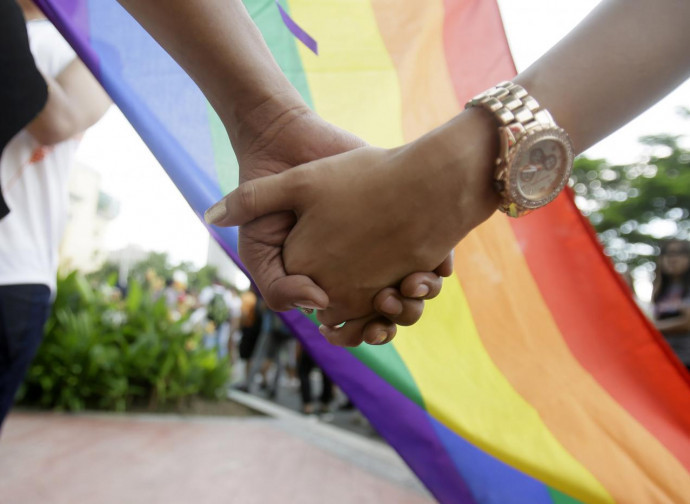Switzerland, Catholic website offers church list for ‘gay blessings’
The Swiss organisation ‘Alliance for Catholic Equality’ has published a list of parishes willing to ‘bless’ irregular and same-sex couples. Few priests are listed, but the Fiducia supplicans drift continues to make headway.

A list of parishes for gay blessings. A sort of Rainbow Guide to churches where homosexual couples can go to receive a blessing not as God commands, but as Víctor Manuel Fernández commands.
The idea came from the Swiss Allianz Gleichwürdig Katholisch (AGK, Alliance for Catholic Equality), an organisation of secular pseudo-Catholics based in Lucerne which gathers within its ranks individuals, groups and ‘other associations that share the vision of an equal Catholic Church’ but not a hierarchical one.
Last 15 July, the Helvetian organisation published a list of parishes available to bless homosexual couples and irregular couples. They count about twenty with a total of 40 blessors. ‘Queer, unmarried and remarried couples seeking a blessing should immediately know where they are welcome’, reads their website. ‘The AGK offers maintains a list of Catholic priests and parishes that will give a blessing to anyone who requests it'. In reality, one could say fortunately and unfortunately, there are not many priests on the list, most are lay people, including women, therefore the blessing is not liturgical. Nonetheless, on a negative note, if layman and laywoman start to bless inside a church it’s only a matter of time before they will start celebrating ‘mass’, i.e. we will have female priests and married priests administering sacraments. In short, gay blessing kills three birds with one stone.
Moreover, reading on we find the following statement: ‘The principle of #EqualDignityEqualRights must apply to all people, regardless of their life plan. Therefore, For the Alliance Equally Catholic (AGK), it is self-evident that all consensual relationships must be regarded and treated as equal.' So, for the AGK, does this mean that even a consensual incestuous relationship has the dignity of receiving a blessing? And continuing: ‘In many places in Switzerland, it is already established practice for pastoral counsellors to bless unmarried, remarried and queer couples’. This is true and not only in Switzerland. It also occurs in Germany for example. Essentially, Fiducia supplicans is also the result of these illicit practices encouraged rather than forbidden by the bishops. The strategy is well known: create a widespread practice in order to create the preconditions for legal recognition of the same practice.
The Swiss organisation also has a label, ‘Blessings for All’, which can be posted on the parish website or physically on the parish notice board. It is somewhat reminiscent of the ‘Here Methane’ sign posted at petrol stations, to indicate an additional liturgical service which is missing in other churches, a certification of egalitarian and inclusive conformity.
The joyous Helvetic list confirms a worldwide dynamic that has long gripped the Catholic Church: its division. On the surface, there is no longer a single church, but as many churches as there are rainbow colours: there is the church for gays, remarried divorcees, environmentalists and so on. Each has its rites, its principles, its creed: Fiducia supplicans for gays, Amoris laetitia for remarried divorcees, Pachamama for environmentalists. In this quagmire of self-styled Catholic faiths, it becomes necessary and a priority to be recognised also by means of lists: to find oneself among like-minded people, not to disperse, not to be confused with other Catholic acronyms. Even the excluded, despite their dissent and in spite of themselves, end up being perceived as ‘other church’: think of the traditionalists in love with the Vetus Ordo. They too have been forced to publish a list of churches where Mass is celebrated according to the ancient rite. A Church, the Catholic Church, in fact fragmented, broken up and therefore in pieces. But ‘only’ in practice, since the unity of the Church is indefectible because it is guaranteed by Christ and Christ is not divided in Himself.
And speaking of Christ and lists, He also drew up one some time ago. Read here: ‘When the Son of Man comes in his glory with all his angels, he will sit upon the throne of his glory. And all the nations will be gathered before him, and he will separate one from another, as the shepherd separates the sheep from the goats, and he will place the sheep on his right hand and the goats on his left’ (Matthew 25: 31-33).
Müller: Blessings for gay couples are blasphemous
The Prefect Emeritus of the Congregation for the Doctrine of the Faith dismantles the arguments of the declaration Fiducia Supplicans that opens the door to blessings for irregular couples, and calls on priests and bishops to avoid such blessings.
Africa builds “cracked” wall against gay blessings
The bishops' conferences of the Dark Continent rejects blessing homosexual couples because it goes against African culture (what if this changes tomorrow?). Their staunch opposition to Fiducia Supplicans is clear but their argument is weak.
